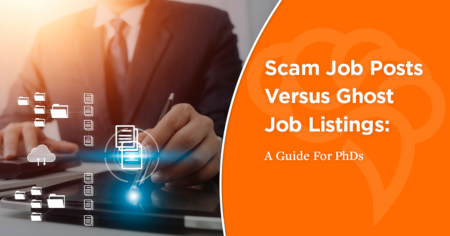Why PhDs Shouldn’t Overlook A Career With A Nonprofit Organization

“What are you going to do with a PhD?”
I was asked this over and over again by friends, family members, and strangers while I was in graduate school.
“Become a professor and do research.”
This was my usual response.
“That’s it?” they’d say.
Okay, now I was stumped.
Yes, that’s it. I think? I’m not sure. What else is there?
After squirming mentally, I’d mumble “Yes, one day” and then change the subject very quickly to avoid further interrogation.
I never really thought about what I could do with my PhD beyond being a professor.
Then…
Life happened.
While spending a full year writing chapter one of my dissertation (Yes, my advisor made me spend one year perfecting one single chapter), the most important person in my life, my grandmother, became terminally ill, and I had to support my family.
Suddenly, “Yes, one day” was no longer a good enough answer.
The more time I spent writing my dissertation, the more frustrated I became with how little impact any of my work would actually have on the real world.
It seemed almost pointless, especially when I compared my dissertation to my family issues.
As I got closer and closer to finishing my thesis, I came to realize the hard truth—I was not cut out to be a lifelong academic.
I was terrified to tell my advisor.
I was terrified about my future too.
I felt like a failure as I tried to live up to everyone’s expectations at home and in graduate school.
As a result, I became anxious and stressed.
One day, I reached a breaking point.
I accepted the academic life was not for me and decided to transition into industry.
I had the heart-to-heart with my advisor (one of the most nerve-wracking, yet liberating things I ever did in graduate school), and then set my sights on getting a job that allowed me to use my research skills the way I wanted to use them.
I’ve always wanted to have an impact on the world.
I wanted to help people directly, on the front lines, not hidden away in some lab.
This is why I decided to get a nonprofit industry job.
I also decided to join the Cheeky Scientist Association and, as a result, I’ve not only transitioned into the nonprofit industry but have continued to be promoted within it.
PhDs And The Growing Nonprofit Industry
The majority of PhD students and postdocs do not consider a nonprofit career as an option for them.
They believe that doing nonprofit work means you don’t make any money.
As if doing meaningful work and being paid well for it is impossible.
Or, they believe that nonprofit work is not significant.
As if the phrase “nonprofit” means not-good-enough or not-important or less-than.
The truth is the nonprofit sector is very powerful and full of great job opportunities.
According to the U.S. Nonprofit Jobs report, “Holding the Fort: Nonprofit Employment During a Decade of Turmoil,” published by the Johns Hopkins Center for Civil Society Studies, the nonprofit job sector is the third largest sector, behind retail, trade and manufacturing. And…
Over half (57%) of all these nonprofit jobs are in the healthcare industry.
Nonprofits are also a large part of private employment, with 64% of private employment in education, and 43% of private employment in healthcare.
In other words…
The nonprofit industry in fields relevant to life science and STEM PhDs is gigantic.
You might be thinking…
Okay, but are there any PhD-level jobs in the nonprofit sector?
A Survey of Earned Doctorates from National Science Foundation found that there are approximately 45,500 PhDs employed in the private, nonprofit sector.
These numbers are up from 45,100 in 2010 and up from 29,650 in 2003.

4 Tips For Getting A Job With A Nonprofit Organization
Are you sick of obsessing over publishing the perfect article or book chapter for months (or years) that only a handful of people (if you are lucky) will ever read?
Do you yearn to use your expertise to make a difference in the world?
If you’re a PhD who wants to have a bigger impact on the world, consider pursuing a career with a nonprofit organization.
Nonprofit organizations are in need of talented PhDs with advanced knowledge and skills who can think critically, devise new ideas, and apply their expertise to solve big problems.
Many of these nonprofit organizations value research and see such work as necessary to advance their mission.
Here are 4 tips for getting a job in the nonprofit sector…
1. Commit to being part of the bigger picture.
A large part of getting ahead in the nonprofit sector is about being committed to a very large vision.
In academia, you can get bogged down by small questions, like the ones you need to answer to make some reviewer happy.
In the for-profit sector, your daily life is dominated by concerns about a bottom-line and profitability.
But, in the nonprofit industry, you can focus exclusively on answering the big questions, whether or not money is involved.
When thinking about a particular nonprofit job, consider if you’re the kind of PhD who wants to leverage his or her skills to a larger cause.
Are you a big picture person?
Or, do you like small questions and small details.
Commitment to the larger picture is key.
But, you will need to balance your desire to make an impact with factors such as salary, work hours, and work-life balance.
Having an understanding of doing important work will help you put all of these important considerations into perspective and choose the job and career path that works best for you.
2. Find a cause you care about and get informed.
What do you actually care about?
This is the very first question you need to ask yourself before transitioning into the nonprofit industry.
Next, you need to research your cause.
You have a PhD—you’re an expert researcher—act like it.
This legwork will help you market yourself effectively and narrow your job search to those organizations that are a good fit for you.
Never forget…
As a PhD, you are hardwired to conduct in-depth research quickly.
Use these skills to learn about the problem you want to solve (or greatly improve).
Then, discover what the issue(s) are, who are the major players and stakeholders, what are the unanswered questions, what kind of change do you want to make, and where can you position yourself to make a difference.
3. Attend non-academic events related to your cause.
Start putting yourself out in the real world, not just the academic world.
Begin introducing yourself to and forming connections with people who are like-minded, but not just like you.
Free yourself by going to non-PhD networking events.
Stepping outside of academia and typical PhD networking events is incredibly liberating because it gives you perspective.
You’ll start to realize how rare and valuable you are.
The more you get out there and meet people who care about the issues you care about outside of academia, the more opportunities you’ll see and the more you’ll stand out.
Places like www.netimpact.org and www.idealist.org are great resources.
Once you start attending events and talking to like-minded people (not about a job, but about the issues), you will find that your opinion is not only valued, it’s highly sought after.
The more you get your name out there, the more you’ll be seen as an asset to individuals and organizations in the nonprofit industry.
Like all industry jobs, most nonprofit jobs are filled through word-of-mouth and referrals from recruiters and other professionals.
In the nonprofit sector in particular, you will find that if the right person thinks you are valuable, they will find or create a way to work with you.
4. Market yourself as an expert.
Use your PhD to market yourself as an expert (because you are!).
Market yourself as someone with unique experiences and skills who can advance the organization’s overall purpose.
When the time comes to apply for jobs (after you have done your networking), spend some time finding out about the structure of the organizations you’re interested in (websites are great place to find tons of information).
Your goal is to determine whether or not a nonprofit is an established organization with consistent, stable funding streams, a start-up nonprofit, or a nonprofit completely reliant on grant funding.
These details will have a significant impact on the type of work you do, your day-to-day responsibilities, and ultimately the kind of impact you can make.
One thing to keep in mind…
Every nonprofit organization values grant writing.
If you love grant writing and have experience successfully securing research grants, nonprofits will especially appreciate you.
When positioning yourself for a job in a nonprofit organization, commit to being part of the bigger picture. Next, find a cause you care about and get informed, and start attending non-PhD networking events outside of academia. Finally, market yourself as an expert who can advance the strategies, goals, and overall purpose of the nonprofit organization. You’ve taken your intellectual lumps and bruises by getting your PhD. Now it’s time for you to start doing meaningful work and having a real impact on the world.
If you’re ready to start your transition into industry, you can apply to book a free Transition Call with our founder Isaiah Hankel, PhD or one of our Transition Specialists. Apply to book a Transition Call here.

ABOUT JANAY CODY
Janay Cody holds a PhD in Political Science from the University of Notre Dame. She has served as a senior research associate, a research consultant for the National Assessment of Educational Progress, and as a senior research manager.
More Written by Janay Cody




























































